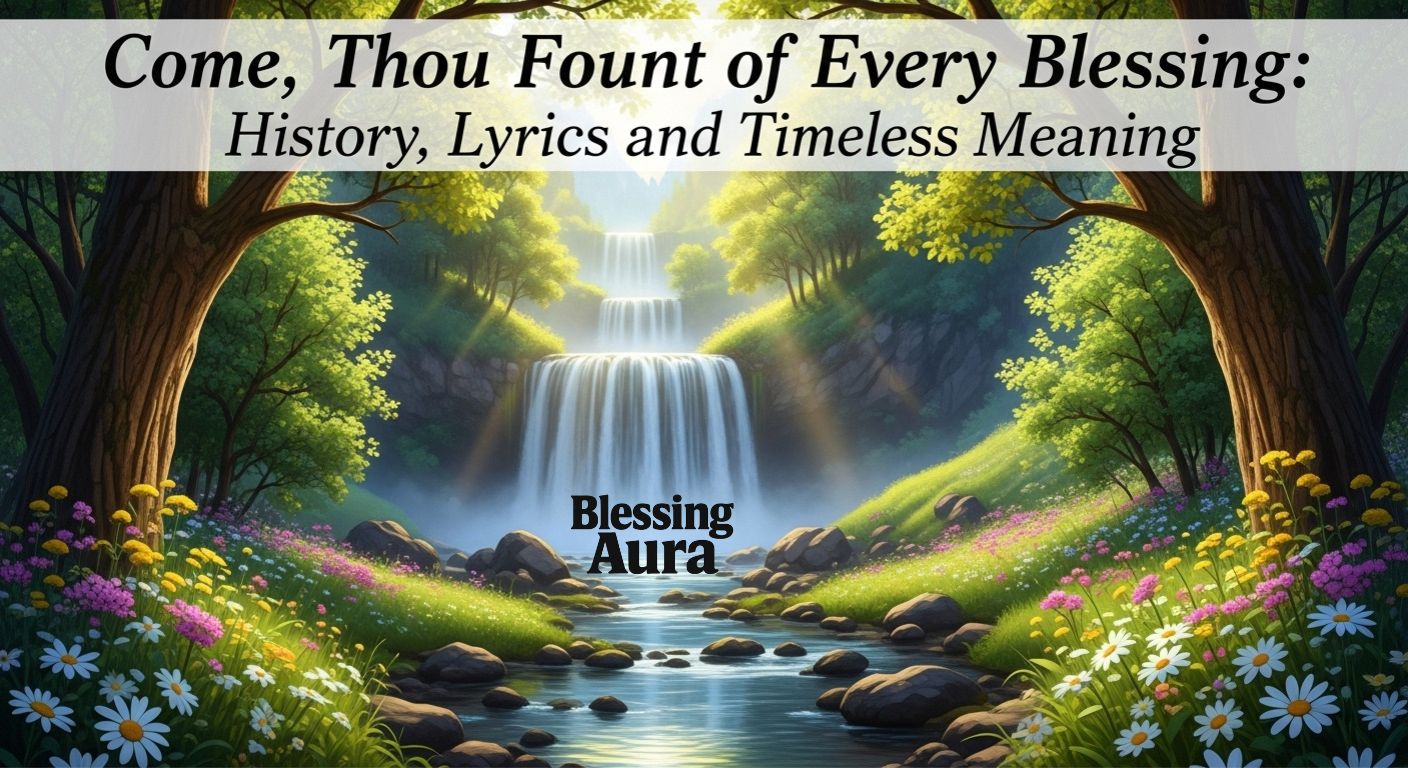Come, Thou Fount of Every Blessing is one of the most loved hymns in Christian hymn history. Written by Robert Robinson, this hymn has carried deep meaning for believers across generations. It began during a time of religious revival meeting London and has since been sung in churches, choirs, and homes. The hymn is both a song of mercy and forgiveness and a heartfelt prayer for guidance. Its verses remind us of our weakness, our tendency to be prone to wander, and the saving power of grace. Come, Thou Fount of Every Blessing continues to inspire gratitude and praise to God.
What Is Come, Thou Fount of Every Blessing?

Come, Thou Fount of Every Blessing is a Christian hymn that has touched believers for more than two hundred years. It is often called a plea for God’s mercy and a hymn of gratitude and praise to Jesus Christ. The words invite us to keep our heart tuned to God, reminding us that we are often prone to wander, but God’s grace can bring us back.
The hymn speaks to both the mind and the heart. It asks God to help us in our weakness and to guide us on the path to Heavenly Father. Many Christians love this hymn because it is both personal and universal, carrying the spirit of worship and deep trust in God.
The History Behind Come, Thou Fount of Every Blessing

The hymn was written in the 18th century during a time of religious revival meetings in London. People were seeking deeper faith and were often moved to tears as they heard hymns about mercy and forgiveness. These revival meetings influenced the young man who wrote the hymn, leaving a lasting mark on Christian hymn history.
Over time, Come, Thou Fount of Every Blessing was sung in many American folk tune hymn traditions, and it traveled across churches and families. It appeared in early hymnals and collections, becoming one of the most well-loved hymns in the English-speaking world.
Who Wrote Come, Thou Fount of Every Blessing?
The author was Robert Robinson, a young preacher who once struggled with doubt. At the age of twenty-two, after attending a religious revival meeting in London, he turned his heart toward God. Soon after, he wrote this hymn as a way of expressing his newfound faith and deep need for God’s guidance.
Robert Robinson captured the feeling of being human: weak, restless, and yet saved by God’s atonement. His words continue to echo across generations because they capture the struggle of the soul and the hope found in grace and repentance.
The Story of Robert Robinson and His Hymn
After writing the hymn, Robert Robinson served as a preacher and teacher. His words reflected a young man’s honest plea for God’s mercy and his confession of being prone to wander. The hymn became his legacy, far greater than any of his other writings.
It is said that Robinson himself later felt far from faith, but when reminded of his own hymn, he was touched and drawn back toward God. This story shows how hymns can live beyond the writer’s own life, pulling hearts closer to Jesus Christ and the hope of return home to God.
Exploring the Lyrics of Come, Thou Fount of Every Blessing
The hymn begins with the words “Come, Thou Fount of every blessing, tune my heart to sing Thy grace.” This line captures the central theme: asking God to help us tune our hearts to God. Just like a musical instrument can be out of tune, so can our hearts drift away.
Later verses include the famous prone to wander hymn line, which admits our weakness. But in the same breath, the hymn turns us back toward mercy and forgiveness, offering hope through the grace of Jesus Christ.
Biblical Inspiration in Come, Thou Fount of Every Blessing
The hymn uses imagery from the Bible. The phrase “Here I raise mine Ebenezer” comes from 1 Samuel 7:7–12, when Samuel set up a stone as a reminder of God’s help. The hymn also connects with scriptures like Psalm 51:1–3, 10, where David pleads for a clean heart, and Ephesians 1:3, which speaks of blessings in Jesus Christ.
Here is a table showing scriptural connections to the hymn:
| Hymn Line | Scripture Connection | Meaning |
| “Here I raise mine Ebenezer” | 1 Samuel 7:7–12 | God’s help and remembrance |
| “Tune my heart to sing Thy grace” | Psalm 51:10 | A clean and renewed heart |
| “Jesus sought me when a stranger” | 1 Peter 1:18–19 | Redemption through Christ’s blood |
| “Prone to wander, Lord I feel it” | Alma 5:26–27 | Self-examination and repentance |
The Meaning of “Here I Raise Mine Ebenezer”
Many wonder about the phrase “Here I raise mine Ebenezer.” In the Bible, 1 Samuel 7:7–12 describes Samuel raising a stone after Israel was saved by God. He called it Ebenezer, which means “stone of help.”
In the hymn, this line reminds us that we must place spiritual markers in our lives. These are moments of gratitude and praise when we see God’s hand guiding us on the path to Heavenly Father. They remind us to never forget the power of His grace and mercy.
Why Come, Thou Fount of Every Blessing Remains Popular Today
Even though the hymn is centuries old, it continues to inspire. Its message about weakness and overcoming fallen nature is timeless. The words speak of repentance, grace, and aligning with God’s will, themes that are as fresh today as they were in Robinson’s time.
Modern Christians use the hymn in family gospel activities and gospel study guides: Atonement, Grace, Repentance. Parents often teach children the idea of tuning your heart to God, showing how faith can stay strong even when life feels “out of tune.”
Modern Versions and Recordings of Come, Thou Fount of Every Blessing
The hymn appeared in the Emma Smith hymn collection Nauvoo 1841 and later in the Nauvoo hymnal. It was also part of the 1948 hymnal Church but was excluded from Hymns (1985) exclusion, which disappointed many members. However, the hymn is included in Hymns—For Home and Church, showing its lasting importance.
Many choirs and musicians have performed the hymn. One of the most famous is Mack Wilberg’s arrangement, often sung by The Tabernacle Choir on Temple Square. His version blends tradition with rich harmony, bringing the hymn to life for modern audiences.
How Come, Thou Fount of Every Blessing Inspires Worship and Faith
The hymn continues to help Christians feel close to God. Singing it in worship brings deep reflection on the atonement, grace, and repentance. It is also a reminder of the constant need for mercy and forgiveness and the hope of one day to return home to God.
Families also use this hymn in family gospel activities hymn teaching. Children can learn about singing in tune vs out of tune, connecting music to the idea of keeping their hearts aligned with God. In this way, the hymn serves as both a spiritual guide and a teaching tool for faith.
FAQ’s
What is the message of Come, Thou Fount of Every Blessing?
The message of Come, Thou Fount of Every Blessing is about grace, repentance, and mercy. It teaches us to tune our hearts to God and follow His guiding love.
Who wrote Come, Thou Fount of Every Blessing?
Robert Robinson wrote Come, Thou Fount of Every Blessing in 1757 after a religious revival meeting in London, expressing his plea for God’s mercy, grace, and forgiveness.
Why do Christians sing Come, Thou Fount of Every Blessing?
Christians sing Come, Thou Fount of Every Blessing to remember God’s atonement, grace, and mercy. It helps them feel gratitude, overcome weakness, and walk the path to Heavenly Father.
What does the line prone to wander mean in Come, Thou Fount of Every Blessing?
The prone to wander hymn line in Come, Thou Fount of Every Blessing means people often drift away from God, but His forgiveness and grace call them back to Him.
How has Come, Thou Fount of Every Blessing been sung over time?
Over the years, Come, Thou Fount of Every Blessing appeared in the Nauvoo hymnal, the 1948 hymnal Church, and in Mack Wilberg arrangements sung by The Tabernacle Choir on Temple Square.
Conclusion
Come, Thou Fount of Every Blessing is a hymn that speaks to the soul. It tells us about grace, mercy, and the love of Jesus Christ. The words of Come, Thou Fount of Every Blessing remind us that we are often prone to wander, but God always calls us back. When we sing Come, Thou Fount of Every Blessing, we ask Him to tune our hearts to His will and guide us home.
The message of Come, Thou Fount of Every Blessing is timeless. It has lived through hymnals, choirs, and family worship. Come, Thou Fount of Every Blessing connects scripture, prayer, and song in a simple way. By singing Come, Thou Fount of Every Blessing, we show gratitude and praise. The hymn helps us stay on the path to Heavenly Father. That is why Come, Thou Fount of Every Blessing will never fade.

Welcome to Blessing Aura! I’m Muhammad Anas, an Digital Marketer and Ebay Dropshipping Expert with 1 year of experience, I help business, brands and store to grow online. My goal is to run ads and sell effective products for everyone, Let’s achieve more together!

